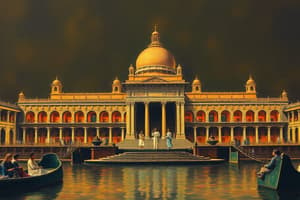Podcast
Questions and Answers
What are the two houses that make up the Parliament of India?
What are the two houses that make up the Parliament of India?
The Lok Sabha and the Rajya Sabha
What are the main responsibilities of the Parliament of India?
What are the main responsibilities of the Parliament of India?
Enacting laws, approving budgets, and overseeing the functioning of the government
What is the historical origin of the Parliament of India?
What is the historical origin of the Parliament of India?
Its roots trace back to the Government of India Act, 1858
What role does the Parliament of India play in the governance of the country?
What role does the Parliament of India play in the governance of the country?
Describe the legislative process followed by the Parliament of India.
Describe the legislative process followed by the Parliament of India.
Identify and explain the significance of the two houses of the Parliament of India.
Identify and explain the significance of the two houses of the Parliament of India.
Discuss the historical evolution of the Parliament of India from the Government of India Act, 1858 to its present form.
Discuss the historical evolution of the Parliament of India from the Government of India Act, 1858 to its present form.
Explain the structure and functioning of the Parliament of India, including the role of the President, Lok Sabha, and Rajya Sabha.
Explain the structure and functioning of the Parliament of India, including the role of the President, Lok Sabha, and Rajya Sabha.
Detail the meticulous legislative process followed by the Parliament of India, including the stages involved in the passage of bills.
Detail the meticulous legislative process followed by the Parliament of India, including the stages involved in the passage of bills.
Examine the Parliament of India's role as a powerhouse of democracy and its impact on the governance and decision-making processes of the country.
Examine the Parliament of India's role as a powerhouse of democracy and its impact on the governance and decision-making processes of the country.
Examine the impact of the Parliament of India on the governance and decision-making processes of the country, and discuss its role as a powerhouse of democracy.
Examine the impact of the Parliament of India on the governance and decision-making processes of the country, and discuss its role as a powerhouse of democracy.
Detail the stages involved in the meticulous legislative process followed by the Parliament of India for the passage of bills.
Detail the stages involved in the meticulous legislative process followed by the Parliament of India for the passage of bills.
Explain the historical evolution of the Parliament of India from the Government of India Act, 1858 to its present form.
Explain the historical evolution of the Parliament of India from the Government of India Act, 1858 to its present form.
Discuss the structure and functioning of the Lok Sabha and the Rajya Sabha within the Parliament of India.
Discuss the structure and functioning of the Lok Sabha and the Rajya Sabha within the Parliament of India.
What are the main responsibilities of the President within the Parliament of India?
What are the main responsibilities of the President within the Parliament of India?
Flashcards are hidden until you start studying




